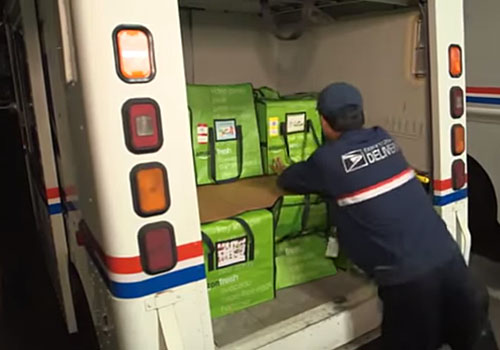
Postal Service seeks Bank of America NSA
The U.S. Postal Service has filed a negotiated service agreement request for Bank of America with the Postal Regulatory Commission, the first NSA request based purely on cost savings rather than requiring a volume threshold for the incentives. NSAs are special service and rate arrangements between the USPS and a mailer or group of mailers. Proponents say NSAs encourage greater volume by rewarding postal customers with discounts and premium services.
“We intend for this NSA to produce cost savings for both the postal service and Bank of America,” said Mike Plunkett, USPS acting vice president for pricing and classification.
The Feb. 7 filing said this NSA aims to provide incentives that will encourage an individual mailer to engage in voluntary changes in mail preparation that will reduce the costs to the postal service of handling the mailer’s mail.
The NSA would encourage Bank of America, one of the world’s largest financial institutions, to undertake certain activities to reduce the cost to the USPS of processing its First Class and Standard mail, including mail that is entered into the mail stream by or on behalf of a Bank of America subsidiary or affiliate.
The postal service requests that the Postal Regulatory Commission submit to the USPS Board of Governors a recommended decision on the NSA. Though worksharing and other cost-saving incentives incorporated in the general rate schedule in the past 20 years have been well received by mailers, the USPS said, they were limited to tactics that a large number of mailers could accomplish, such as presorting, barcoding and drop-shipping. The USPS expects to achieve additional savings by offering incentives for activities beyond those that most mailers are willing and able to achieve. The USPS said this NSA requires operational commitments from Bank of America including: implementing the agency’s four-state barcode, OneCode ACS, Confirm, Seamless Acceptance, FAST and eDropship; barcoding of Courtesy and Business Reply Mail and Qualified Business Reply Mail; and a waiver of physical return of certain First Class and Standard mail.
The discounts payable to Bank of America, New York, will be determined quarterly based on actual submitted mail volumes and the actual measured improvements in address quality, with Bank of America receiving a percentage of costs saved.
For this NSA, the agency does not depend on a particular minimum volume, and so it is presented as a baseline case. “It is the first pure cost-savings NSA submitted to the PRC for approval, and the first NSA in which the financial incentives for cost savings are keyed to measured reductions in postal service costs through means largely left to the judgment of the mailer … rather than to compliance with a specified set of process changes dictated by the postal service,” the USPS said.
The dimensions of address quality that would qualify Bank of America for discounts are improved mail processing performance for First Class and Standard mail; reduced return rates for First Class and Standard mail; and reduced forwarding rates for First Class Mail.
This NSA is the third baseline agreement to be filed with the PRC.
“We are going to see what can we learn from this case in terms of [thinking about] broader price changes,” Mr. Plunkett said.












